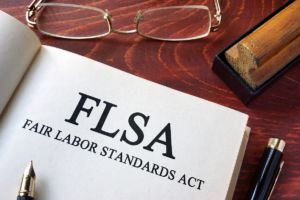 When there’s a legal dispute about an employee’s wages, the Fair Labor Standards Act of 1938 (FLSA) is almost always mentioned. There are a number of reasons for this, including the fact that it’s a federal law, which means it will apply regardless of what state the employee is in. This blog post will provide an overview of this important wage and hour law that comes up so often in unpaid wage claims.
When there’s a legal dispute about an employee’s wages, the Fair Labor Standards Act of 1938 (FLSA) is almost always mentioned. There are a number of reasons for this, including the fact that it’s a federal law, which means it will apply regardless of what state the employee is in. This blog post will provide an overview of this important wage and hour law that comes up so often in unpaid wage claims.
FLSA Requirements
The FLSA sets forth many requirements concerning workplace wages. But the most important ones include a prohibition of child labor, payment of a minimum wage ($7.25 per hour as of July 24, 2009) and the requirement of time-and-a-half pay for the hours an employee works which exceed 40 hours per week.
While most employers pay their employees in cash, the FLSA doesn’t require cash compensation. However, if an employer chooses to pay its employees in a non-cash form, they must pay the employee with something easily converted into cash or another legally allowable form, like goods, lodging or food.
A few things that the FLSA does not require with respect to compensation are severance pay and paid time off, such as sick days, vacation days and holidays.
Who Is Covered by the FLSA
The FLSA does not apply to every employer or all workers. For example, only employees enjoy its wage protections, not Independent contractors. But being an employee doesn’t guarantee FLSA wage protections either.
The FLSA allows employers to avoid paying for overtime or minimum wage if its employees are “exempt.” Whether an employee is exempt can require a complex and detailed analysis, but for the most part, exempt employees include those who make more than $455 per week, receive a salary (as opposed to an hourly wage) and engage in high level functions for the employer.
As for the employers, they are only subject to the FLSA if they either engage in interstate commerce or collect $500,000 or more in revenue each year. It seems as if many small employers can escape the FLSA’s wage requirements, but that rarely happens. This is because an employer that interacts with another business or customer in another state will usually meet the FLSA’s interstate commerce requirements, no matter how little money it earns.
Deadline for Obtaining FLSA Relief
An employee who feels the employer owes them unpaid wages pursuant to FLSA’s mandates has two primary avenues of relief. First, they can file a claim with the US Department of Labor. Second, they can file a lawsuit in court. Whichever path they take, they will have two years from the day of the last paycheck to bring legal action. However, an employee may have up to three years if the FLSA violation was willful.
Remedies Through the FLSA
If an employer finds itself in violation of the FLSA, the employee can not only recover his or her unpaid wages, but also liquidated damages equal to the unpaid wages. The ability to collect liquidated damages means an aggrieved employee can potentially recover double the unpaid wage claim.
But the ability to collect liquidated damages isn’t always guaranteed. If the employer can prove its FLSA violation was made in good faith, a court may decide not to allow liquidated damages. If the employee isn’t able to collect liquidated damages, the employee can still seek attorney’s fees and court costs.
Summing It Up
- The FLSA requires employers to pay their eligible employees a minimum wage. If the employee works more than 40 hours in a week, the employer must provide at least time-and-a-half pay for those overtime hours.
- The FLSA only applies to employees and not independent contractors.
- Most employers will find themselves subject to the FLSA because most courts interpret the FLSA’s interstate commerce requirement very broadly.
- The FLSA can be enforced with a lawsuit or by filing a claim with the US Department of Labor. Whichever path the employee takes, they will have at most three years (most likely two years) from the date of the last paycheck to take legal action.
- The FLSA allows an employee to be able to recover up to two times the unpaid wages, plus attorney’s fees and court costs.
For More Information
If you feel that your employer has improperly withheld wages from you, please contact us for a no cost online review of your case.
But if you’re not ready for that step yet, check out the Pay and Overtime section of our website to learn more about your employment issue.
You can also get more information about the FLSA by going to the US Department of Labor’s “Compliance Assistance – Wages and the Fair Labor Standards Act (FLSA)” page.





